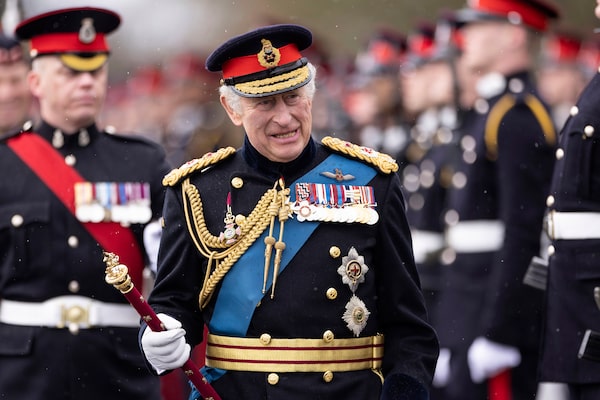
Britain's King Charles III inspects the 200th Royal Military Academy Sandhurst Sovereign's Parade and presents the new Colours and Sovereign's Banner to the receiving Ensigns in Camberley, England, on April 14.Dan Kitwood/The Associated Press
King Charles’ official Canadian title does not include the role of “defender of the faith” in a move that senior church figures and constitutional experts say is a departure from centuries of tradition.
A change to the law, designating how he will be known as King of Canada, misses out the role, which dates back to the time of Henry VIII.
The venerable Richard Spencer, retired Archdeacon of the Diocese of Saskatoon, said the change marked “a historic departure from tradition.”
“I think it is very significant,” he said. “The Monarch has always been the defender of the Christian faith. It’s more than symbolism.”
The impending change to the Royal Styles and Titles Act in Canada, officially alters the monarch’s title in Canada following the death of Queen Elizabeth.
The change comes just weeks before King Charles III’s coronation at Westminster Abbey in London on May 6, conducted by the Archbishop of Canterbury.
A Government bill implementing the Ottawa budget, published this week, will officially bring about the change. It says the monarch will be officially known as: “Charles the Third, by the Grace of God King of Canada and His other Realms and Territories, Head of the Commonwealth.”
Annie Cullinan, spokeswoman for the Office of the President of the King’s Privy Council for Canada, said “a decision was made to modernize the title to bring Canada in line with other Commonwealth countries, including Australia.”
His mother, Queen Elizabeth, had the longer title: “Elizabeth the Second, by the Grace of God of the United Kingdom, Canada and Her other Realms and Territories Queen, Head of the Commonwealth, Defender of the Faith.”
Like King Charles she was head of the Church of England, sister church to Canada’s Anglican church.
Archbishop Linda Nicholls, Primate of the Anglican Church of Canada, said King Charles has “in the past spoken of being a ‘defender of faith’ in Britain, recognizing the spiritual rights all faiths practised there and not just the Christian faith.”
“The change to his title in Canada recognizes the limitations of his role in a multicultural, multi-faith country,” she said.
There have been reports in the British press of disagreements between King Charles and Church leaders over the role other faiths should play during his coronation. The monarch is reported to want Jewish, Muslim and other faith leaders to take part in the service in Westminster Abbey, contrary to canon law.
Professor Andrew Heard, a constitutional expert at Simon Fraser university, said omitting defender of the faith from King Charles’ title marked “a break with tradition” but reflected Canada’s view of the monarch.
“There is a greater sensitivity to both pluralism and secularism in Canada and there is a desire not to align the monarch with a particular faith,” he said. “The King is in no way the head of the Anglican Church in Canada.”
Defender of the faith has been used by the monarch since Tudor times.
In 1543, England’s Parliament conferred the title of Defender of the Faith on Henry VIII, after he broke with Rome over his wish to divorce his first wife, Catherine of Aragon. He was originally granted the title by Pope Leo X, but it was withdrawn by Rome after the schism which led to the founding of the Church of England.
In 1867, Benjamin Disraeli, who was then Conservative Prime Minister, brought in a Royal Titles bill proclaiming Queen Victoria as Empress of India, in a move opposed by Liberal MPs.
The monarch can have different styles and titles in each of their realms.
In England, F.D. an abbreviation of “fidei defensor,” Latin for defender of the faith, will appear on English coins alongside King’s Charles’s portrait, the Royal Mint has revealed. The King’s portrait will appear on a 50p coin which will enter circulation on the day of the coronation in Britain.
In Canada F.D. does not appear on Canadian coins featuring the Queen’s portrait.
The Rt. Reverend William Cliff, Bishop of Brandon, said the Queen’s title of defender of the faith had not been used publicly in Canada for decades.
Speaking of its omission from King Charles’s Canadian title Bishop Cliff said: “It’s been politely dropped.”